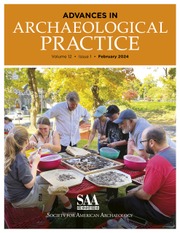Article contents
Advocating for Preservation
What Is Advocacy and How to Be an Archaeology Influencer
Published online by Cambridge University Press: 14 October 2021
Abstract
Over the past few years our body politic has become increasingly polarized: Republicans versus Democrats, conservatives versus liberals. That polarization filters down to governmental actions, policies, and decisions, evidenced in disagreements over regulation versus deregulation and fossil fuels versus renewable energy. Such polarization—whether legislative, administrative, or judicial and whether at the federal, state, or tribal level—can and does impact the management of our archaeological resources and the way cultural resource management is practiced in the United States. Given that most archaeologists in the United States are employed in cultural resource management, these actions affect their employment. Consequently, it is more critical than ever that archaeologists become cultural resource management and historic preservation advocates. This article discusses the whys and hows of preservation advocacy. Active, science-based advocacy by preservationists can engage governmental decision-makers to give due consideration to cultural resources and their management when making decisions or drafting and voting on legislation. Although the discussion focuses on advocacy at the federal level, the observations and suggestions are applicable at the state and local level.
En los últimos años, nuestro cuerpo político se ha polarizado cada vez más: los republicanos vs. los demócratas, los conservadores vs. los liberales. Esa polarización se filtra a las acciones, políticas y decisiones del gobierno, como se evidencia en los desacuerdos sobre la regulación vs. la desregulación y los combustibles fósiles vs. la energía renovable. Tal polarización —ya sea legislativa, administrativa o judicial, y ya sea a nivel federal, estatal o tribal— puede impactar (y impacta) la gestión de nuestros recursos arqueológicos y cómo se practica la gestión de los recursos culturales en los Estados Unidos. Ya que la mayoría de los arqueólogos en los Estados Unidos tienen puestos en la gestión de los recursos culturales, estas acciones afectan a su empleo. En consecuencia, ya es más fundamental que nunca que los arqueólogos se conviertan en defensores de la gestión de los recursos culturales y de la preservación histórica. Este artículo trata del “por qué” y el “cómo” de la defensa de la preservación. La propugnación que es activa, basada en la ciencia y por parte de las conservacionistas puede obligar a los tomadores de decisiones gubernamentales a que consideren a los recursos culturales y su gestión a la hora de hacer decisiones o redactar y votar la legislación. Aunque la discusión se centra en la propugnación a nivel federal, las observaciones y sugerencias se pueden aplicar a nivel estatal y local.
Keywords
- Type
- How to Series
- Information
- Copyright
- Copyright © The Author(s), 2021. Published by Cambridge University Press on behalf of Society for American Archaeology
References
REFERENCES CITED
A correction has been issued for this article:
- 1
- Cited by
Linked content
Please note a has been issued for this article.


